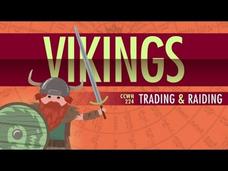Macat
An Introduction to Thomas Malthus' An Essay on the Principle of Population
Can human population ever exceed its ability to produce food? High schoolers watch a short overview of Thomas Malthus's An Essay on the Principle of Population to learn more about the subsistence level of the human population, and how...
PBS
Proving Pick's Theorem
Pick up a resource on Pick's Theorem. Individuals watch a video explaining how to find the area of a polygon drawn on a lattice using Pick's Theorem. The film also shows a proof of the theorem using the Euler characteristic and algebra.
PBS
Kill the Mathematical Hydra
Feel like Hercules for a day. Individuals watch a video that describes how to defeat a mathematical Hydra that grows additional heads when one is cut off. The solution requires scholars to use ordinals and the well-ordering theorem.
American Battlefield Trust
Civil War Trust Animated Map: Gettysburg
The poignant words of Abraham Lincoln's Gettysburg Address echoed over the dedication of a battlefield to the fallen soldiers, who paid the ultimate price for the victory. High schoolers watch the pivotal moment in an informative and...
3Blue1Brown
Limits | Essence of Calculus, Chapter 7
There's no limit on the importance of the limit in calculus. Scholars learn the formal definition of derivative and the epsilon-delta definition of limit by watching a video. They also listen to an explanation of l'Hospital's Rule.
MinutePhysics
The Physics of Car Crashes
Engineering the design of a car is a lesson in physics! Learners watch as the narrator describes how a car absorbs the impact during a crash. The instruction highlights acceleration and deceleration patterns and quantifies the amount of...
Veritasium
How Does The Earth Spin?
It's a new spin on acceleration! Watch as visitors at a park try to explain the rotation of the Earth using a granite model. The interviewer demonstrates the application of force in different directions to cause the sphere to accelerate...
Crash Course
Who Started World War I: Crash Course World History
World War I was one of the more complicated and complex conflicts of the twentieth century—but who started it? High schoolers watch a video from Crash Course World History ponders whether Germany, Austria, or Russia were to blame for...
FuseSchool
Equation of a Straight Line y=mx+c
What do the graph of a line and its equation have in common? This is the first question the video poses to scholars as they begin watching the lesson. The instructor then explains how to use the graph to write the linear equation.
Crash Course
Asian Responses to Imperialism: Crash Course World History #213
World history is full of the glorious fanfare of the expansion of Western civilization, but was it perceived that way by the Eastern hemisphere? High schoolers watch a video from Crash Course World History to learn more about how Western...
Deep Look
Watch Flesh-Eating Beetles Strip Bodies to the Bone
A large beetle colony needs only one or two days to completely clean the bones of small animals. The video focuses on the dermestid beetles' flesh-eating abilities. Museums use these beetles to preserve specimens, leaving the most...
FuseSchool
Extinction of Species
Extinction: i's not just for dinosaurs! Young ecologists examine the alarming facts about the causes of mass extinctions by watching this engaging Fuse School Evolution video. Topics include previous extinction events, living fossils,...
Crash Course
The Vikings! - Crash Course World History 224
The only thing your high schoolers may know about Vikings is that they wore horns on their helmets—and according to a Crash Course World History video, that's not even true! Watch a short description of Vikings as tradesmen rather than...
Veritasium
5 Fun Physics Phenomena
Magnetic cereal? Bendable water? Young scientists study five physics phenomena by watching a video from the Veritasium playlist. The narrator accompanies each demonstration with descriptions of what is happening—or appears to be happening.
JFR Science
Using an Electronic Balance
Is there a wrong way to use an electronic balance? Don't let your class find out! Ensure flawless mass measurement using a short video from JFR Science. Learners listen and watch while the narrator zeros the balance and measures out a...
Socratica
What Is Biochemistry?
Watch as chemistry comes alive! Socratica's biology playlist kicks off with a simple video detailing the principle components of biochemistry. Content includes carbohydrates, proteins, and nucleic acids. The narrator describes each class...
FuseSchool
Human Defense Systems Against Pathogens
With so many harmful agents around us, how do humans stay healthy? Find out by watching an informative video from a larger biology playlist that details our defenses against a variety of pathogens. The narrator describes the body...
Physics Girl
What Are Quarks? Sugar Edition!
Even scientists don't really understand quarks! Learners watch as the instructor describes what scientists do know about quark particles and their interaction with each other. The lesson dispels myths that individuals may have about...
SciShow
Triton: The Celestial 'Cantaloupe'
Where can we find sources of water in our solar system? It seems Neptune's moon may be an option. A video lesson explores the characteristics of Neptune's largest moon Triton. There are many unique features that may surprise your classes...
Periodic Videos
Lutetium
Did you know the element lutetium is named after Paris, France? Learn about this interesting connection and more as you watch video 71 in a 118-part series. Each video discusses one element in the periodic table and the associated...
Mathispower4u
Real Numbers
Real mathematicians have mastery of real numbers. Pupils learn about the classification of real numbers by watching a YouTube video. They also see how to compare real numbers and how to determine absolute value.
Crash Course
The History of Chemical Engineering: Crash Course Engineering #5
The American Revolution: the catalyst for the development of chemical engineering. Scholars watch an informative video that describes the history of chemical engineering, beginning with France's need to produce soda ash as a result of a...
Mathispower4u
Solving an Equation with One Set of Parentheses
Time to distribute some learning! The video lesson teaches how to solve an equation by applying the distributive property. Learners watch as the instructor completes each step, explaining as he goes. The first step to solving uses the...
Crash Course
The Columbian Exchange
The Columbian Exchange completely changed the way the world traded goods with one another. Scholars watch a video to get a close look at the positives and negatives of the Columbian Exchange—and how the world would never be the same.

























